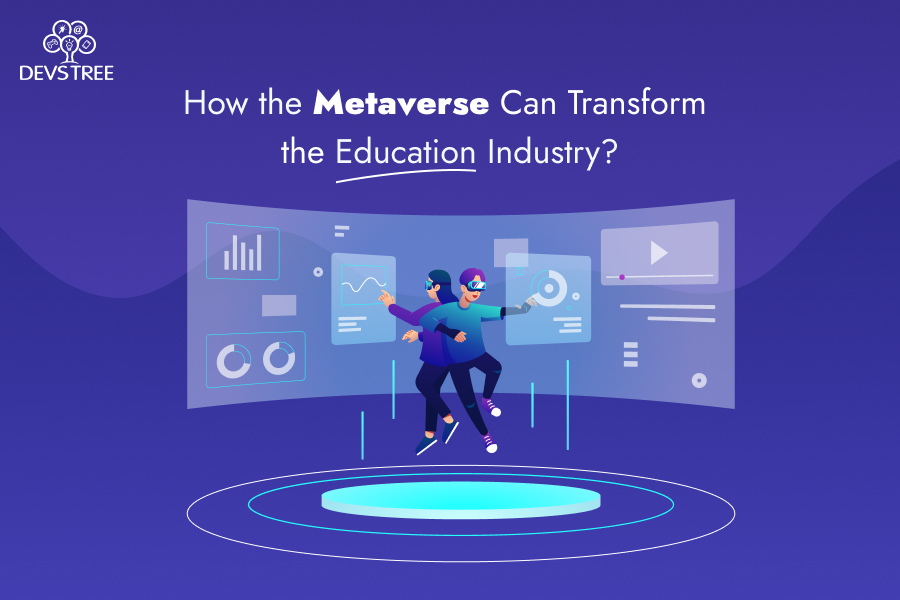- December 7, 2023
- by devstree
- Technology
- 1300 Views
- 1 Comment
The metaverse of the future – which will combine augmented reality (AR), virtual reality (VR), and artificial intelligence into one immersive imaginary world – has enormous implications for the development of educational technology.
The rise of the Metaverse has the potential to reshape the Education Industry significantly. This digital frontier seamlessly merges the virtual and physical realms, introducing immersive learning experiences. Students can now interact within dynamic 3D environments, collaborate globally, and approach subjects through engaging gamified methods. Real-time simulations, AI-guided personal tutors, and social interactions within the Metaverse amplify engagement and understanding. This innovation transcends geographical constraints, promoting universal accessibility to education. As educational institutions incorporate Metaverse technologies, traditional classrooms undergo a metamorphosis into vibrant hubs of knowledge exchange, nurturing creativity, critical thinking, and adaptability among learners. This transformative shift is poised to redefine the education industry, establishing a more interconnected and impactful learning landscape.
Now, let’s delve into specific instances illustrating how the metaverse is revolutionizing educational and training environments.
Cloud-Based Classrooms
Virtual learning environments will allow students to log in from anywhere and enable teachers to customize their online classrooms for their lesson plans.
Immersive Learning Environments:
The metaverse can provide immersive and interactive learning environments within cloud-based classrooms. Students and educators can access these virtual spaces, enhancing collaboration and communication.
Spatial Audio and Presence:
With spatial audio and realistic avatars, the metaverse can simulate the physical presence of individuals in a shared space. This creates a more engaging and natural collaborative experience, making online learning feel more like traditional in-person classes.
Augmented Reality (AR) in Education
AR technology in the metaverse allows us to create digital overlays on top of real-world objects in the classroom, turning all kinds of moments into opportunities for students to connect and engage at a deeper level with the material they’re studying.
Real-time Information Overlay:
By integrating AR into the metaverse, students can receive real-time information overlays on their physical environment. This can be particularly useful in fields like medicine, where students can learn about anatomy by visualizing 3D models overlaid on physical objects.
Field Trips and Virtual Objects:
The metaverse can enable AR-enhanced field trips or experiences. Students can use AR devices to explore virtual objects or historical sites overlaid on the real world, creating a dynamic and interactive learning environment.
Virtual Reality (VR) in Education:
In theory, any skills acquired through hands-on experience can be enhanced through immersive training, making the potential for VR in education within the metaverse vast.
Immersive Learning Experiences:
The metaverse can integrate seamlessly with VR technologies, offering more realistic and immersive learning experiences. Students can explore historical events, conduct virtual science experiments, or even travel to places around the world without leaving their physical location.
Interactive Simulations:
Within the metaverse, interactive simulations and scenarios can be facilitated, enabling students to apply theoretical knowledge in practical situations. This hands-on approach serves to improve the comprehension and retention of complex concepts.
Benefits of Metaverse in Education:
The metaverse holds several potential benefits for education, offering innovative ways to enhance learning experiences and create more engaging and immersive educational environments. Here are some key benefits of incorporating the metaverse into education:
Immersive Learning Environments:
The metaverse can offer immersive and interactive learning environments that go beyond traditional classroom settings. Virtual reality (VR) and augmented reality (AR) technologies can create realistic simulations, enabling students to explore historical events, conduct virtual experiments, or even travel to places that would otherwise be inaccessible. This immersive experience enhances engagement and deepens understanding.
Global Collaboration:
The metaverse can facilitate global collaboration among students and educators. Virtual classrooms and collaborative spaces enable individuals from different parts of the world to connect, share ideas, and work together on projects. This can foster cultural exchange, diverse perspectives, and a more globalized approach to education.
Personalized Learning:
Metaverse technologies can be used to tailor educational experiences to individual learning styles and preferences. Through data analytics and AI-driven systems, educational platforms in the metaverse can adapt content and teaching methods to meet the specific needs of each student. This personalization can enhance learning outcomes by addressing individual strengths and weaknesses.
Expanded Access to Education:
The metaverse can break down geographic barriers and make education more available, providing remote or underserved areas access to high-quality educational resources and experiences without needing physical presence. This democratization of education helps bridge any educational opportunities gaps while creating more inclusive learning environments.
Skill Development for the Future:
In the rapidly evolving digital landscape, the metaverse can prepare students for the skills required in the future workforce. Exposure to virtual environments, digital collaboration platforms and leading technologies equip students with crucial digital literacy, adaptability, problem-solving abilities that align education more closely with 21st-century job markets.
The Future of Metaverse in Education Field:
The future of the metaverse in education is poised to revolutionize traditional learning approaches. Expect widespread integration of metaverse technologies in both physical and online classrooms, ushering in immersive experiences through virtual and augmented reality tools. These innovations will redefine education by offering engaging simulations, virtual field trips, and interactive activities. The metaverse is set to connect global education communities, allowing seamless collaboration among students and educators worldwide.
Continuous professional development will undergo a transformation with professionals leveraging virtual environments for ongoing training and skill enhancement. Anticipate a shift towards innovative teaching methods, such as gamified learning and personalized educational experiences, becoming the new norm. Customizable learning paths will empower students to explore subjects at their own pace. As classrooms evolve into tech-savvy spaces, the metaverse holds the promise of breaking down barriers to education, and providing accessible and inclusive learning experiences. However, this transformative journey necessitates careful consideration of ethical, privacy, and regulatory concerns for responsible metaverse integration in educational settings.
